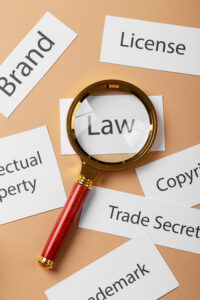Copyright, as described by the World Intellectual Property Organisation (WIPO), is the rights that creators have over their literary and artistic works, which range from books, music, paintings, sculpture, and films to computer programs, databases, advertisements, maps, and technical drawings. This intellectual right grants the author of a work the exclusive right to determine its accessibility to others.
The principal legislation for copyright protection in Nigeria is the Copyright Act of 2022 (Act No. 8 of 2022), which, by Section 77, established the Nigeria Copyright Commission. It is a body corporate responsible for all matters relating to the administration, regulation, and enforcement of copyright in Nigeria. Authors are entitled to two major rights protected under copyright, which are economic rights and moral rights. Economic right is the financial reward that an author enjoys from the use of his works by others, while moral right is the recognition, respect, authorship, and objection to the use or enjoyment of intellectual properties by the owner.
CATEGORIES OF COPYRIGHT WORKS
The act prescribed a certain set of works as eligible for copyright protection:
- Literary works such as novels, poetic works, plays, stage directions, audiovisual work scenarios and broadcasting scripts, choreographic works, computer programs, textbooks, treaties, histories, biographies, essays and articles, encyclopaedias, dictionaries, directories, anthologies, letters, reports, memoranda, lectures, addresses, sermons, law reports (excluding decisions of courts), written tables and compilations, including tables or compilations of data stored or embodied in a computer or any medium.
- Musical works, such as musical compositions, irrespective of musical quality.
- Artistic works such as paintings, drawings, etchings, lithographs, woodcuts, engravings, prints, maps, plans and diagrams; works of sculpture; photographs not comprised in an audiovisual work; works of architecture in the form of building models; and works of artistic craftsmanship, including pictorial woven tissues and articles of applied handicraft.
- Audiovisual works such as movies, music videos, documentaries, animations, web series, short films, and advertising commercials.
- Sound recordings such as podcasts, music tracks (audio), live concert recordings, voice recordings, audiobooks, DJ mixes, instrumental beats, and studio sound effects.
- Broadcasts such as radio and television broadcasts, live sports broadcasts, and satellite transmission to the public.

ELIGIBILITY OF COPYRIGHT PROTECTION
The two requirements of a work to be eligible for copyright protection are originality and fixation. Thus, a copyrighted work must exhibit originality and be fixed in a tangible medium of expression. The rationale behind the requirement is that copyright protects the expression of the idea or thoughts and not the idea.
REGISTRATION OF COPYRIGHT IN NIGERIA
Unlike trademarks, copyright protection automatically exists without any registration. However, there is a voluntary notification process with a certificate issued by the Nigerian Copyright Commission, which serves as a notice of the existence of the work. Copyright owners are strongly encouraged to obtain this certificate to serve as evidence of the existence of such work and also for future references. The formalities for the registration of copyright are highlighted below:
Ascertain the eligibility of the work for copyright protection. The work proposed to be protected by copyright must be within the category listed under the Copyright Act.
Provide copies of work to be registered. Copies of the work to be registered (usually 2) are to be submitted alongside the application form for proper examination, compliance, and eligibility.
Copyright registration application form. The form can be obtained online via the Nigerian Copyright Commission eRegistration Portal or physically at the Commission.
Application submission. Properly filled applications are submitted alongside (2) copies of work and evidence of payment of a prescribed fee, which are then reviewed to ensure compliance with copyright laws. The processing usually takes six weeks before it is finally completed.
Issuance of Certificate. Upon a successful review of the application, a certificate of registration will then be awarded to the applicant.
DURATION OF COPYRIGHT
Copyright of literary, artistic, and musical works is valid for the lifetime of the author and lasts for 70 years from the date of the author’s death. Audiovisual works and photograph copyrights are valid for 50 years after the work was created, if not made available to the public or 50 years after the end of the year in which the work is first made available to the public. For sound recording, copyright is valid for 50 years after the recording was first made available to the public with the consent of the author. while broadcast copyright subsists for 50 years after the end of the year in which the broadcasts first took place. Consequently, these works become freely usable to the public after the expiration of the protection term.
 TRANSFER OF COPYRIGHT OWNERSHIP
TRANSFER OF COPYRIGHT OWNERSHIP
Generally, ownership of copyright is vested in an author who may be a citizen of Nigeria or resident in Nigeria, a corporate body incorporated under Nigerian law, or, in the case of joint authorship, any of the authors is a citizen of Nigeria, resident in Nigeria, or a corporate body incorporated under Nigerian law. Copyright is considered movable property under Nigerian law and is transferable by assignment, testamentary disposition, or operation of law.
Assignment of copyright ownership is a written transfer of rights on existing or future works by the author (assignor) to the other party (assignee). Testamentary disposition of copyright ownership, on the other hand, is the bequeathal of copyright ownership to a benefactor outlined in the owner’s will or last testament and which takes effect upon the death of the owner. There are instances where copyright ownership can be transmitted through the operation of law, such as where a debtor is declared bankrupt by a court, his property (including copyright) becomes liable for distribution among his creditors; where a copyright owner dies intestate, his work devolves according to the applicable rules of intestate succession; or expiration of the copyright term where the work goes into the public domain.
INFRINGEMENT OF COPYRIGHT.
Copyright accords an author the exclusive right to exploit his works, which may be infringed upon by a third party. The Act enunciates that copyright infringement is by any person who without the authorization of the owner of the copyright, does or causes any person to do an act, which constitutes a violation of the exclusive rights conferred under this Act; imports or causes to be imported into Nigeria any copy of a work which if it had been made in Nigeria would be an infringing copy under this Act; sells, offers for sale or hire any work; makes or has in his possession, plates, master tapes, machines, equipment or contrivances used for the sole purpose of making infringing copies of the work; permits a place of public entertainment or of business to be used for a public performance of the work, where the performance constitutes an infringement of copyright in the work unless the person permitting the place to be used was not aware and had no reasonable ground to suspect that the performance constitutes an infringement of the copyright; permits within its premises, the reproduction of a copyrighted work; or performs or causes to be performed for trade or business or the promotion of a trade or business, any work in which copyright subsists.
ENFORCEMENT OF COPYRIGHT.
Authors can tackle infringement by enforcement actions usually brought through civil cases, upon which an author will be entitled to an award of damages, an injunction restraining the person from continuing their act of infringement, or other remedies depending on the situation. An infringer may suffer criminal liability, as copyright infringement is also a criminal offence. Notwithstanding, enforcement can be instituted through criminal and civil proceedings simultaneously. An infringement action can be instituted only by the owner of the works or an authorised person. At the commencement of the action, it should be ascertained that the infringer was aware of the copyright at the time of infringement before an infringement claim. However, if the infringer can prove to be unaware, the owner will be entitled to an account of profits from the infringement. Copyright can be enforced through civil remedies, criminal sanctions, and other conservatory measures to be enforced by the court.
